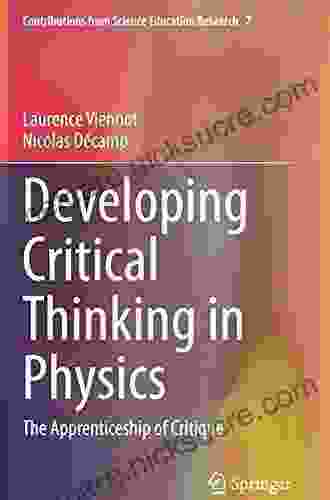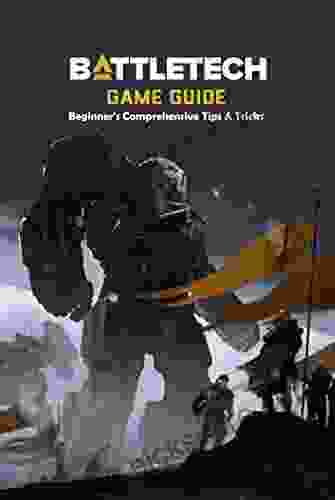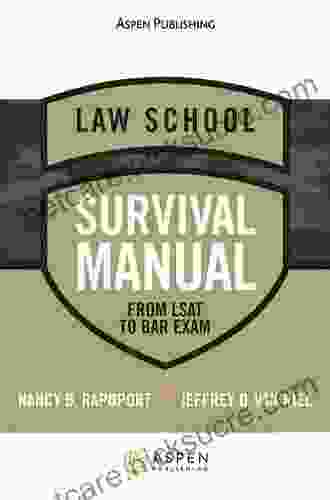The Apprenticeship of Critique: Contributions from Science Education Research

5 out of 5
| Language | : | English |
| File size | : | 14019 KB |
| Text-to-Speech | : | Enabled |
| Screen Reader | : | Supported |
| Enhanced typesetting | : | Enabled |
| Word Wise | : | Enabled |
| Print length | : | 241 pages |
The ability to critically evaluate scientific arguments and evidence is essential for informed decision-making in a world where science plays an increasingly important role. However, research has shown that many students struggle to develop these skills. This article explores the apprenticeship of critique, a process by which students learn to critically evaluate scientific arguments and evidence. The article draws on research from science education to identify key elements of the apprenticeship of critique, and discusses how these elements can be incorporated into science teaching.
Key Elements of the Apprenticeship of Critique
The apprenticeship of critique is a complex process that involves a number of different elements. These elements include:
- Domain knowledge: Students need to have a strong understanding of the scientific content they are critiquing. This includes knowledge of the relevant concepts, theories, and methods.
- Argumentation skills: Students need to be able to identify and evaluate the arguments that are being made in a scientific text. This includes being able to identify the claims, evidence, and reasoning that are being used to support the arguments.
- Evidence evaluation skills: Students need to be able to evaluate the evidence that is being used to support scientific arguments. This includes being able to assess the quality of the evidence, and to identify any potential biases or flaws.
- Metacognitive skills: Students need to be able to reflect on their own understanding of scientific arguments and evidence. This includes being able to identify their own biases and assumptions, and to assess the strengths and weaknesses of their own arguments.
Incorporating the Apprenticeship of Critique into Science Teaching
There are a number of ways to incorporate the apprenticeship of critique into science teaching. These include:
- Explicit instruction: Teachers can provide students with explicit instruction on the key elements of the apprenticeship of critique. This can be done through lectures, discussions, or hands-on activities.
- Modeling: Teachers can model the apprenticeship of critique by thinking aloud as they evaluate scientific arguments and evidence. This can help students to see how experts approach the process of critique.
- Feedback: Teachers can provide students with feedback on their attempts to critique scientific arguments and evidence. This feedback can help students to identify their strengths and weaknesses, and to develop their skills.
- Assessment: Teachers can assess students' understanding of the apprenticeship of critique through a variety of methods. These methods can include essays, presentations, or portfolios.
The apprenticeship of critique is a valuable process that can help students to develop the skills they need to critically evaluate scientific arguments and evidence. By incorporating the apprenticeship of critique into science teaching, teachers can help students to become more informed and critical thinkers.
References
- Bartholomew, H. C., Osborne, J., & Ratcliffe, M. (2004). Teaching students to evaluate evidence: An exploration of argument-based science instruction. Journal of Research in Science Teaching, 41(9),913-930.
- Bell, R. L., & Linn, M. C. (2000). Scientific arguments as learning artifacts: Designing for learning from the analysis of real and simulated scientific discourse. Journal of the Learning Sciences, 9(1),1-47.
- Driver, R., Newton, P., & Osborne, J. (2000). Establishing the norms of scientific argumentation in classrooms. Science Education, 84(3),287-312.
- Kuhn, D. (2010). Education for thinking. American Psychologist, 65(1),14-21.
- Osborne, J. (2010). Arguing to learn in science: The role of collaborative, critical discourse. Science Education, 94(4),621-648.
- Simon, S., & Johnson, C. (2015). Facilitating students' appropriation of critique as a sociocultural practice. Journal of Science Teacher Education, 26(1),61-82.
5 out of 5
| Language | : | English |
| File size | : | 14019 KB |
| Text-to-Speech | : | Enabled |
| Screen Reader | : | Supported |
| Enhanced typesetting | : | Enabled |
| Word Wise | : | Enabled |
| Print length | : | 241 pages |
Do you want to contribute by writing guest posts on this blog?
Please contact us and send us a resume of previous articles that you have written.
 Fiction
Fiction Non Fiction
Non Fiction Romance
Romance Mystery
Mystery Thriller
Thriller SciFi
SciFi Fantasy
Fantasy Horror
Horror Biography
Biography Selfhelp
Selfhelp Business
Business History
History Classics
Classics Poetry
Poetry Childrens
Childrens Young Adult
Young Adult Educational
Educational Cooking
Cooking Travel
Travel Lifestyle
Lifestyle Spirituality
Spirituality Health
Health Fitness
Fitness Technology
Technology Science
Science Arts
Arts Crafts
Crafts DIY
DIY Gardening
Gardening Petcare
Petcare 6th Edition Kindle Edition
6th Edition Kindle Edition Phil Mickelson
Phil Mickelson Jamie Whyte
Jamie Whyte Jean Yves Leloup
Jean Yves Leloup Denis Dwyer
Denis Dwyer Fletcher Dunn
Fletcher Dunn Harold Simmons
Harold Simmons Irene Spencer
Irene Spencer 15th Edition Kindle Edition
15th Edition Kindle Edition Paul Haddad
Paul Haddad James Proctor
James Proctor Katie Singer
Katie Singer Brian Fagan
Brian Fagan Michele Smith
Michele Smith Daisaku Ikeda
Daisaku Ikeda Jim Baggott
Jim Baggott Lavinia Collins
Lavinia Collins Harry Fisch
Harry Fisch Robert Clifton Robinson
Robert Clifton Robinson Carola Hein
Carola Hein Andrew Solomon
Andrew Solomon Spire Study System
Spire Study System Mambo Chita Tann
Mambo Chita Tann Day Schildkret
Day Schildkret Emily Vikre
Emily Vikre Ellie Marney
Ellie Marney Tim Hollister
Tim Hollister Jody Morse
Jody Morse Clark A Campbell
Clark A Campbell Joshua James
Joshua James Dinah Bucholz
Dinah Bucholz Jeremy Lent
Jeremy Lent Sarah A Reinhard
Sarah A Reinhard Peter Lightbown
Peter Lightbown Natalia Molina
Natalia Molina Ian Stewart
Ian Stewart Andrew Evans
Andrew Evans Jareth Tempest
Jareth Tempest Karl Rehn
Karl Rehn Will Nett
Will Nett Mike Lanza
Mike Lanza Loudell F Snow
Loudell F Snow Webb Chiles
Webb Chiles Guillermo Gonzalez
Guillermo Gonzalez Mike Bender
Mike Bender Glenda Green
Glenda Green Mark Miller
Mark Miller Belinia Xenrale
Belinia Xenrale David Clark
David Clark Rebekah Dodson
Rebekah Dodson Fern Nichols
Fern Nichols William E Glassley
William E Glassley Amanda Brooks
Amanda Brooks Joseph Mercola
Joseph Mercola 1st Ed 2019 Edition Kindle Edition
1st Ed 2019 Edition Kindle Edition Vikas Bhushan
Vikas Bhushan Ashley Stanford
Ashley Stanford Tim Powers
Tim Powers Janice Hudson
Janice Hudson Liz Thomas
Liz Thomas Lech A Grzelak
Lech A Grzelak Michael R Canfield
Michael R Canfield Amanda Kingloff
Amanda Kingloff Jacob Stegenga
Jacob Stegenga Keith Bowden
Keith Bowden Paul Freedman
Paul Freedman David Kahn
David Kahn Janet Godwin
Janet Godwin Hesam Nemounehkhah
Hesam Nemounehkhah Latham Thomas
Latham Thomas Clifford E Trafzer
Clifford E Trafzer Anthony Burgess
Anthony Burgess Pete Magill
Pete Magill Jesse M Ehrenfeld
Jesse M Ehrenfeld Hana Ali
Hana Ali David Weber
David Weber R J Vickers
R J Vickers Dierdre Wolownick Honnold
Dierdre Wolownick Honnold Forrest Willett
Forrest Willett Tadahiko Mizuno
Tadahiko Mizuno Sean Fitz Gerald
Sean Fitz Gerald Mike Barrett
Mike Barrett Thomas Lickona
Thomas Lickona Nick Redfern
Nick Redfern Stacey Steinberg
Stacey Steinberg Alice Roberts
Alice Roberts Edward A Bell
Edward A Bell Carol Matsuzaki
Carol Matsuzaki Sarah Thompson
Sarah Thompson Wabun Wind
Wabun Wind Peter Heller
Peter Heller Ali Psiuk
Ali Psiuk Bilingual Edition Kindle Edition
Bilingual Edition Kindle Edition Bruce Brown
Bruce Brown Cal Peternell
Cal Peternell Rana Conway
Rana Conway Naomi Moriyama
Naomi Moriyama James Ragonnet
James Ragonnet Alex Hibbert
Alex Hibbert Brad Myers
Brad Myers S Elia
S Elia Xiufeng Liu
Xiufeng Liu Charles Fleming
Charles Fleming Mindfulness Hypnosis Academy
Mindfulness Hypnosis Academy Julia Rutland
Julia Rutland Dr Mike Grevlos
Dr Mike Grevlos Irina Szmelskyj
Irina Szmelskyj Hafsah Faizal
Hafsah Faizal Kara Goucher
Kara Goucher Sandra Uwiringiyimana
Sandra Uwiringiyimana Asti Hustvedt
Asti Hustvedt Kev Reynolds
Kev Reynolds Chip Ingram
Chip Ingram Felicia Pizzonia
Felicia Pizzonia Alice Waters
Alice Waters Karen L Cox
Karen L Cox Richard E Nisbett
Richard E Nisbett Robyn Ryle
Robyn Ryle Kim Dwinell
Kim Dwinell Alan Greenfield
Alan Greenfield Jamil Zaki
Jamil Zaki Adam Rutherford Phd
Adam Rutherford Phd Editions La Plume D Eros
Editions La Plume D Eros Shalini Shankar
Shalini Shankar Elizabeth Field
Elizabeth Field Daniel H Pink
Daniel H Pink Egerton Ryerson Young
Egerton Ryerson Young Jack Newfield
Jack Newfield Larry A Yff
Larry A Yff Gill Stewart
Gill Stewart Nancy B Rapoport
Nancy B Rapoport Natsuki Takaya
Natsuki Takaya George Grimm
George Grimm My Daily German
My Daily German Mara Rutherford
Mara Rutherford Traci Chee
Traci Chee Nicole Libin Phd
Nicole Libin Phd Christa Mackinnon
Christa Mackinnon Wendy Sullivan
Wendy Sullivan Scott Matthews
Scott Matthews Nicole Zasowski
Nicole Zasowski Andrea Olson
Andrea Olson Chris Stringer
Chris Stringer Arden Rose
Arden Rose Sophie Kinsella
Sophie Kinsella Rachel Reed
Rachel Reed Leona S Aiken
Leona S Aiken Bud Hasert
Bud Hasert Lisa Marasco
Lisa Marasco George Mount
George Mount Samantha Boardman
Samantha Boardman James M Tabor
James M Tabor Suzy Hopkins
Suzy Hopkins Andrea Sfiligoi
Andrea Sfiligoi Ray Mcnulty
Ray Mcnulty Mark Vee John
Mark Vee John Kajal Gupta
Kajal Gupta Raven Morgaine
Raven Morgaine Ashlee Kasten
Ashlee Kasten Alexandre Paiva
Alexandre Paiva Mark Lattanzi
Mark Lattanzi Matthew Harffy
Matthew Harffy 1st Ed 2016 Edition Kindle Edition
1st Ed 2016 Edition Kindle Edition Chris J Ellis
Chris J Ellis M L Buchman
M L Buchman House Of Talent
House Of Talent Michael Clarke
Michael Clarke Judith Warner
Judith Warner Wolfgang Jank
Wolfgang Jank John L Havlin
John L Havlin David Wolff
David Wolff Bill Rodgers
Bill Rodgers Burt L Standish
Burt L Standish Otto Toeplitz
Otto Toeplitz Eryk Lewinson
Eryk Lewinson Michael Schiavone
Michael Schiavone Grace Liu
Grace Liu Monica Beyer
Monica Beyer Saroo Brierley
Saroo Brierley Eric Sevareid
Eric Sevareid Maia Motley
Maia Motley Kay Kennedy
Kay Kennedy Taran Matharu
Taran Matharu Tom Chivers
Tom Chivers Ron Larson
Ron Larson Carmen Acevedo Butcher
Carmen Acevedo Butcher Heather A Smith
Heather A Smith Jandy Nelson
Jandy Nelson Dana Trentini
Dana Trentini Dorthe Berntsen
Dorthe Berntsen Helen Batten
Helen Batten Robyn Perry Worthington
Robyn Perry Worthington Lei Wang
Lei Wang Ben Rothenberg
Ben Rothenberg Holly Hook
Holly Hook Ian Sample
Ian Sample Harvey Penick
Harvey Penick Travis Senzaki
Travis Senzaki Ric Conrad
Ric Conrad Estelle Maskame
Estelle Maskame Steve Crawford
Steve Crawford Christian Straube
Christian Straube Sara Snow
Sara Snow Matthew Dworak
Matthew Dworak Bruce Chatwin
Bruce Chatwin Lindsey Bliss
Lindsey Bliss Gerd Gigerenzer
Gerd Gigerenzer Evy Poumpouras
Evy Poumpouras Mae Ilami Onyekwum
Mae Ilami Onyekwum Barry Ord Clarke
Barry Ord Clarke Zachary Willey
Zachary Willey Louise Warneford
Louise Warneford Claire Dunn
Claire Dunn 1st Ed 2021 Edition Kindle Edition
1st Ed 2021 Edition Kindle Edition Paul Johnson
Paul Johnson Elizabeth Heavey
Elizabeth Heavey Richard Hofstadter
Richard Hofstadter Paul A Laviolette
Paul A Laviolette Derald Wing Sue
Derald Wing Sue Nancy Hendrickson
Nancy Hendrickson Ben Coates
Ben Coates Robert Lomas
Robert Lomas Ann Jackson
Ann Jackson Robert Oerter
Robert Oerter David Faulkner
David Faulkner Michael Borenstein
Michael Borenstein Elaine Heney
Elaine Heney H Lee Jones
H Lee Jones Helen Garabedian
Helen Garabedian Mark Santino
Mark Santino Bill Douglas
Bill Douglas Marisa Kanter
Marisa Kanter Diane Vaughan
Diane Vaughan Yaron Seidman
Yaron Seidman Gary E Schwartz
Gary E Schwartz Os Guinness
Os Guinness Kathy Farrokhzad
Kathy Farrokhzad Samuel Owedyk
Samuel Owedyk Modestus Anabaraonye
Modestus Anabaraonye Terry Pratchett
Terry Pratchett Piotr Naskrecki
Piotr Naskrecki Megan Sloan
Megan Sloan Stanley Vast
Stanley Vast Alexandra Witze
Alexandra Witze Robyn Hawkins
Robyn Hawkins Raymond Arsenault
Raymond Arsenault Rebecca Solnit
Rebecca Solnit Charlotte Eliopoulos
Charlotte Eliopoulos Jon Young
Jon Young Dk Publishing
Dk Publishing Lori Bregman
Lori Bregman Maureen Dempsey
Maureen Dempsey Dan Robson
Dan Robson Isa Herrera
Isa Herrera Lisa R Cohen
Lisa R Cohen Gary Dierking
Gary Dierking Sharon Wilkins
Sharon Wilkins Karen Kovacs
Karen Kovacs Amanda Claridge
Amanda Claridge Lenora Chu
Lenora Chu Joshua G Shifrin
Joshua G Shifrin Diane H Tracey
Diane H Tracey Raichelle Carter
Raichelle Carter Stephen C Meyer
Stephen C Meyer Launi Meili
Launi Meili Jacob Gardner
Jacob Gardner Stephen Bodio
Stephen Bodio Christopher Hook
Christopher Hook S K Gupta
S K Gupta Nicholas J Saunders
Nicholas J Saunders Dylan Dethier
Dylan Dethier Didier Reiss
Didier Reiss Nageshwar Sah
Nageshwar Sah Edward Marston
Edward Marston Robert Milner
Robert Milner Joshua Darwin
Joshua Darwin James Adams
James Adams Ewan Mcgregor
Ewan Mcgregor Geoff Johns
Geoff Johns David Fine
David Fine Jacqueline Carey
Jacqueline Carey Duncan Hamilton
Duncan Hamilton Julie Angus
Julie Angus Leonard Sax
Leonard Sax Francis L Macrina
Francis L Macrina Timothy Dickeson
Timothy Dickeson Tyler Lansford
Tyler Lansford Geoff Powter
Geoff Powter Stephen R Lawhead
Stephen R Lawhead Bob Allcorn
Bob Allcorn David I Spivak
David I Spivak Karyn Garvin
Karyn Garvin Graham Priest
Graham Priest Lars Anderson
Lars Anderson Pat Manley
Pat Manley Randall M Packard
Randall M Packard Michael Archer
Michael Archer Leonie Mack
Leonie Mack Kristen Thrasher
Kristen Thrasher Laura Luther
Laura Luther Nathan D Lang Raad
Nathan D Lang Raad Emily Chetkowski
Emily Chetkowski Steve Garratt
Steve Garratt Knowledge Tree
Knowledge Tree Tillie Cole
Tillie Cole Wendy Higgins
Wendy Higgins Philip Coppens
Philip Coppens Kim Mack Rosenberg
Kim Mack Rosenberg Rollo Tomassi
Rollo Tomassi Brian Meier
Brian Meier Christine E Sleeter
Christine E Sleeter Sara Saedi
Sara Saedi Jason Sumner
Jason Sumner Neil Sagebiel
Neil Sagebiel Craig Clapper
Craig Clapper Mike Chappell
Mike Chappell Joyce L Vedral
Joyce L Vedral Shane Benzie
Shane Benzie Robert Chu
Robert Chu Livy
Livy Ann Olga Koloski Ostrow
Ann Olga Koloski Ostrow Joanne Calderwood
Joanne Calderwood Chad Waterbury
Chad Waterbury Berkshire K Greene
Berkshire K Greene Jacqueline Corricelli
Jacqueline Corricelli Jeff Benedict
Jeff Benedict Patricia B Mcconnell
Patricia B Mcconnell D James Benton
D James Benton Roger Frampton
Roger Frampton Erfun Geula
Erfun Geula Jerome Rand
Jerome Rand Pam Vredevelt
Pam Vredevelt Morten H Christiansen
Morten H Christiansen Alan Naldrett
Alan Naldrett Lani Forbes
Lani Forbes Philip Moore
Philip Moore Adeline Yen Mah
Adeline Yen Mah Guy Harrison
Guy Harrison Bradmd
Bradmd Paul Gaskell
Paul Gaskell Christopher Carter
Christopher Carter Elizabeth Becker
Elizabeth Becker Teddy Atlas
Teddy Atlas Hannu Rajaniemi
Hannu Rajaniemi Manjit Kumar
Manjit Kumar Lh Press
Lh Press Larry Krieger
Larry Krieger M Susan Lindee
M Susan Lindee Bob Chandler
Bob Chandler Kathleen Buckstaff
Kathleen Buckstaff Jonathan Vaughters
Jonathan Vaughters Adam Cesare
Adam Cesare Jane Yeadon
Jane Yeadon Vaclav Smil
Vaclav Smil John Toussaint
John Toussaint Mayim Bialik
Mayim Bialik Daniel Scott
Daniel Scott Orji Onyebuchi
Orji Onyebuchi Janice K Ledford
Janice K Ledford Monte Burch
Monte Burch Peter Hessler
Peter Hessler Elise Hennessy
Elise Hennessy Rafael Nadal
Rafael Nadal Jacob Cohen
Jacob Cohen Sarah A Clark
Sarah A Clark Cathy Raubenheimer
Cathy Raubenheimer Caroline Fidanza
Caroline Fidanza Keshia A Case
Keshia A Case Geraint Thomas
Geraint Thomas Richard Pears
Richard Pears Disha Experts
Disha Experts Arny Alberts
Arny Alberts Andy Kirkpatrick
Andy Kirkpatrick Aron Ralston
Aron Ralston Jay Carter
Jay Carter Peter Burns
Peter Burns Jill Heinerth
Jill Heinerth Doug Degrood
Doug Degrood Intelligent
Intelligent Rosemary Ellen Guiley
Rosemary Ellen Guiley John S Farnam
John S Farnam Sarah Lawton
Sarah Lawton Gerald Beaudry
Gerald Beaudry Paul Annacone
Paul Annacone Gail Buckland
Gail Buckland Taylor Fontenot
Taylor Fontenot Six Sisters Stuff
Six Sisters Stuff Russ Moorhouse
Russ Moorhouse Tim Deroche
Tim Deroche Rick Barba
Rick Barba Amita Jassi
Amita Jassi Alexandra Kenin
Alexandra Kenin Mildred Council
Mildred Council Ronald York
Ronald York Teri Tom
Teri Tom Robert Irwin
Robert Irwin Julie K Briggs
Julie K Briggs Jo Bartlett
Jo Bartlett Pam Jarvis
Pam Jarvis John T Cacioppo
John T Cacioppo Florence Nightingale
Florence Nightingale Jonathan Tarbox
Jonathan Tarbox Alison Pray
Alison Pray Joachim Rossberg
Joachim Rossberg Kyler Shumway
Kyler Shumway Ruth Ware
Ruth Ware Shane Jones
Shane Jones Mark Seidenberg
Mark Seidenberg Alison Gopnik
Alison Gopnik Timothy R Pauketat
Timothy R Pauketat Darril Fosty
Darril Fosty Norman Delgado
Norman Delgado Aaron T Beck
Aaron T Beck Ivana Bajic Hajdukovic
Ivana Bajic Hajdukovic Michael T Mcdermott
Michael T Mcdermott Sharon Copeland
Sharon Copeland Phyllis Franklin
Phyllis Franklin Deborah T Goldberg
Deborah T Goldberg Jay Cassell
Jay Cassell Mary Douglas
Mary Douglas Skylar Kergil
Skylar Kergil Beryl Beare
Beryl Beare Rachael Bell Irving
Rachael Bell Irving Jean Pierre De Caussade
Jean Pierre De Caussade Diana Papaioannou
Diana Papaioannou Philippa Langley
Philippa Langley Desiree Trattles
Desiree Trattles Lou Nanne
Lou Nanne Brent Warner
Brent Warner Seth Tucker
Seth Tucker Robert Lanza
Robert Lanza Cathy Hester Seckman
Cathy Hester Seckman Anne Polli
Anne Polli 1st Ed 2020 Edition Kindle Edition
1st Ed 2020 Edition Kindle Edition John Small
John Small Bryn Huntpalmer
Bryn Huntpalmer Perre Coleman Magness
Perre Coleman Magness Chris Parsons
Chris Parsons Sanjay Sarma
Sanjay Sarma Erin Miller
Erin Miller Jamie Dorobek
Jamie Dorobek Laura Prepon
Laura Prepon Matthew B Crawford
Matthew B Crawford 1st Ed 2018 Edition Kindle Edition
1st Ed 2018 Edition Kindle Edition Tamonya Sands
Tamonya Sands Gary M Schultheis
Gary M Schultheis Karina Manta
Karina Manta J F Tamayo
J F Tamayo R I Chalmers
R I Chalmers Ukay J Ekong
Ukay J Ekong Nick Morrison
Nick Morrison Susan Ludington Hoe
Susan Ludington Hoe Ivor Horton
Ivor Horton David Barrett
David Barrett Anton Angelov
Anton Angelov Evelyn Raab
Evelyn Raab Frank Wilczek
Frank Wilczek Janet Malcolm
Janet Malcolm Franz Boas
Franz Boas Larry Kaniut
Larry Kaniut Joan Ryan
Joan Ryan Susan Alcorn
Susan Alcorn Lawrence T Friedhoff
Lawrence T Friedhoff Daniel L Schacter
Daniel L Schacter R K Agarwal
R K Agarwal Leslie Anthony
Leslie Anthony Jeremy Bhandari
Jeremy Bhandari Jeanne Oliver
Jeanne Oliver Patricia G Lange
Patricia G Lange David Roberts
David Roberts Kaoru Sinozaki
Kaoru Sinozaki Broccoli Lion
Broccoli Lion Daniel Todd Gilbert
Daniel Todd Gilbert Michael Ross
Michael Ross Linda L French
Linda L French Lynne Tolley
Lynne Tolley Michelle Damiani
Michelle Damiani Alan Agresti
Alan Agresti Felicity Cloake
Felicity Cloake Ejike Ifeanyichukwu
Ejike Ifeanyichukwu 1st Ed 2017 Edition Kindle Edition
1st Ed 2017 Edition Kindle Edition Brent E Turvey
Brent E Turvey Jeffrey S Saltz
Jeffrey S Saltz Deborah Spungen
Deborah Spungen Carol Lynn Mckibben
Carol Lynn Mckibben Anthony Haynes
Anthony Haynes Valerie Nash Chang
Valerie Nash Chang Botros Rizk
Botros Rizk T M Mikita
T M Mikita Sally A Lipsky
Sally A Lipsky John Vigor
John Vigor The Lodge Company
The Lodge Company Derek Rowntree
Derek Rowntree Kiley Reid
Kiley Reid Robin Hobb
Robin Hobb 1st Edition Kindle Edition
1st Edition Kindle Edition Marva Collins
Marva Collins Christian Fader
Christian Fader
Light bulbAdvertise smarter! Our strategic ad space ensures maximum exposure. Reserve your spot today!

 Earl WilliamsHow to Study for Standardized Tests: A Comprehensive Guide to Maximizing Your...
Earl WilliamsHow to Study for Standardized Tests: A Comprehensive Guide to Maximizing Your...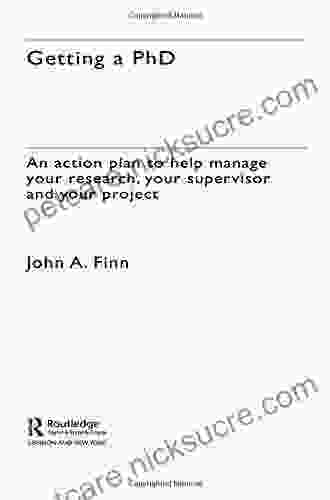
 Jared NelsonAn Action Plan To Help Manage Your Research, Your Supervisor And Your Project
Jared NelsonAn Action Plan To Help Manage Your Research, Your Supervisor And Your Project Chadwick PowellFollow ·2.8k
Chadwick PowellFollow ·2.8k Miguel de CervantesFollow ·7.3k
Miguel de CervantesFollow ·7.3k Jace MitchellFollow ·16.9k
Jace MitchellFollow ·16.9k Cruz SimmonsFollow ·9.2k
Cruz SimmonsFollow ·9.2k Melvin BlairFollow ·13.5k
Melvin BlairFollow ·13.5k Edgar HayesFollow ·3.8k
Edgar HayesFollow ·3.8k Hamilton BellFollow ·13.2k
Hamilton BellFollow ·13.2k Harry CookFollow ·7.9k
Harry CookFollow ·7.9k
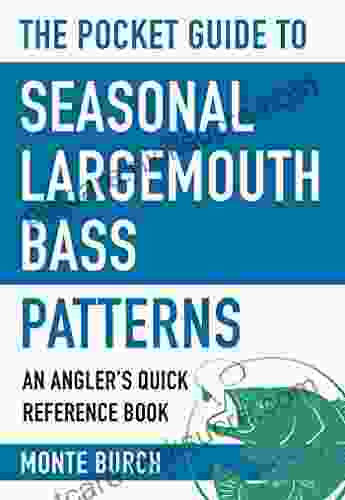
 Marcus Bell
Marcus BellThe Essential Guide to Angler Quick Reference: Your...
Embark on an unforgettable...
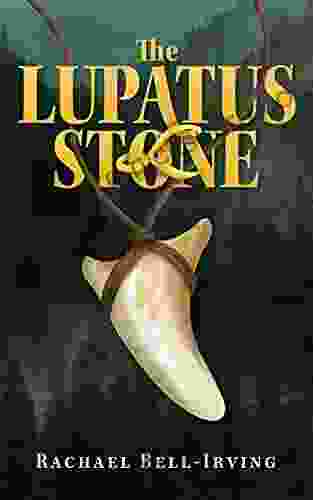
 Juan Butler
Juan ButlerThe Lupatus Stone: A Wicked Conjuring
The Lupatus Stone is a...

 Alvin Bell
Alvin BellUnveiling the Enchanting Memoirs of Lady Hyegyong: A...
In the annals of Korean...
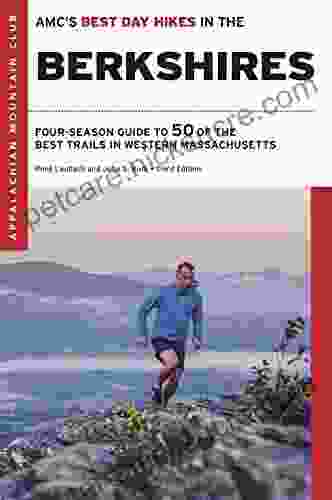
 DeShawn Powell
DeShawn PowellAMC's Best Day Hikes in the Berkshires: Explore Majestic...
The Berkshires, a...
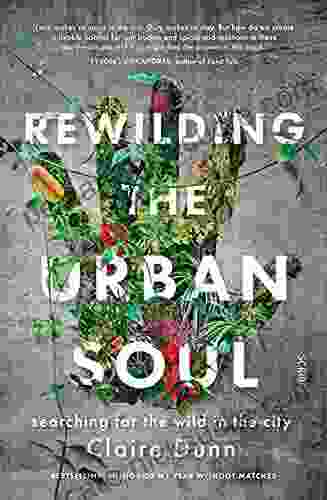
 Clark Campbell
Clark CampbellRewilding The Urban Soul: Reconnecting with Nature in the...
In the heart of sprawling metropolises, where...

 Cruz Simmons
Cruz SimmonsHow to Find Your Family History on a Genealogy Website: A...
Delving into the...
5 out of 5
| Language | : | English |
| File size | : | 14019 KB |
| Text-to-Speech | : | Enabled |
| Screen Reader | : | Supported |
| Enhanced typesetting | : | Enabled |
| Word Wise | : | Enabled |
| Print length | : | 241 pages |


